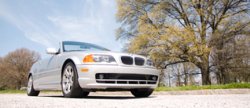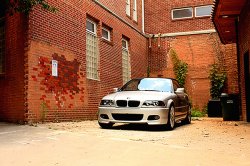chelle Christensen wanted to get into the automotive design program at Pasadena's Art Center College of Design. So admissions officers asked her for a portfolio of car sketches.
She had none.
Christensen had designed prom dresses in high school. She didn't even know car design was a career until her second year of community college in Cupertino, Calif.
Apparently she's a quick study. Now 34, Christensen has designed the new Acura NSX, a Ferrari-fighting supercar making its world debut Monday at the North American International Auto Show in Detroit.
"It looks fast even when it is parked," said Acura General Manager Mike Accavitti. "It is the ultimate expression of the Acura brand."
Cars weren't completely foreign to Christensen when she started a night school class in car design in 2002. As a teen, she hung out with her father in the garage of their San Jose home, watching him tinker with hot rods and muscle cars and eventually learning how to do the work herself.
"I developed a passion for mechanical things," said Christensen, who now lives in downtown Los Angeles. "I like the noise of an engine and the way cars smell."
This second-generation NSX Acura sold its predecessor from 1990 to 2005 will produce an entirely different noise from the roar of a 1967 Chevrolet Chevelle, which has been Christensen's dream car for decades.
The new NSX will be an all-wheel-drive hybrid. A twin-turbocharged, mid-mounted V-6 engine sits behind the two-seat cockpit and powers the rear wheels. Two electric motors, one mounted near each of the front wheels, add additional power and control. A third electric motor is integrated with the engine to supply extra power.
The car is expected to produce 500 horsepower, though Acura hasn't given official figures. The price won't be announced until it goes on sale next year, but is likely to fall in the $120,000 to $180,000 range. It will serve as the "halo" vehicle for the upscale Honda division, Accavitti said, meant to imbue the entire brand with a performance image.
Christensen understands that great design takes more than a great image, said Tisha Johnson, a car designer at Volvo Car Group in Sweden who once taught at Art Center. Designers have to craft a compelling story to sell the design language to those with the power to greenlight ambitious projects, she said.
Although she may have started with no portfolio, Christensen's early car drawings earned her an internship at Volvo's Camarillo studio, Johnson said.
John Krsteski, an Art Center instructor and manager of Hyundai Design North America in Irvine, also saw Christensen's skills develop. He understands why Acura hired her in 2005, then gave Christensen the task of styling its sexiest, most sophisticated car three years ago.
He recalled a performance car concept for Chrysler that Christensen created as an Art Center project.
"She nailed it," Krsteski said. "Michelle showed a solid design sense of proportion and profile in the overall stance of the car."
Krsteski would have liked to hire Christensen for Hyundai, but by then she already had a good relationship with Honda.
Honda recruited Christensen during her last year at Art Center. She also had interest from Chrysler, but that would have required a move to Detroit, not ideal for a California native.
There was another powerful reason to stay in California. Within days of entering the Art Center's car design program, Christensen met fellow student Jason Wilbur, now her husband. They started work at Honda on the same day. He heads Honda's Advanced Design Studio, not far from the couple's downtown apartment.
She is the first female exterior designer at Acura but doesn't believe that gender makes much difference in car design. "Even the guys here will talk about shoes," she said.
Christensen also was given the Women on Top Award by Marie Claire Magazine as an up-and-coming female professional.
Christensen says her life pretty much follows a set pattern. Workout at the CrossFit gym, work and sleep. On the weekends, she participates in CrossFit competitions, plays golf and hikes.
Before the NSX, Christensen worked on Acura's ZDX, a low-slung crossover the automaker scuttled last year. She also contributed to a refresh of the Acura RLX sedan.
The NSX was the first project she headed, and it proved an entirely different challenge.
Christensen had to make a pretty car, but also ensure that the exterior enhanced the NSX's performance. Every curve had to serve a purpose, such as producing aerodynamic down force to push the car toward the pavement to improve traction and cornering. The vehicle needed large but graceful vents to feed the twin-turbo engine and cool the brakes.
"The design had to enhance the function of the car," Christensen. "It forced me to grow as a designer."
The result had what Christensen terms "emotional surfaces" that demand attention and imply movement. At the same time, she wanted an aggressive stance.
"That comes from my background as an American woman who grew up with hot rods," Christensen said.
There were practical considerations, too, such as leaving enough space in the trunk to fit two carry-on bags or one set of golf clubs.
"As a designer, I used to fight that," she said. "Now that I play golf, I understand."
Christensen also took some cues from the previous NSX, including a black roof and tail lights that span the entire width of the rear deck.
Finding other automotive inspiration elsewhere was easy, said Christensen, who commutes to Acura's design center in Torrance in a Honda Pilot.
"Since we are in L.A., we have supercars crawling everywhere," she said, including Ferraris, Bentleys and even an occasional Lamborghini in her building's parking garage.
Elsewhere, Christensen draws inspiration from a touch of fashion design the shoe business and architecture.
She's an admirer of Zaha Hadid, the Iraqi-British architect whose buildings employ honeycomb structures, curves and flowing lines to exude movement. Hadid's design for the King Abdullah Financial District Metro Station in Riyadh, Saudi Arabia, resembles a cruise ship gliding over the sea.
Cars, it turns out, are not so unlike buildings.
"You have a skeleton," Christensen said, "that you have to wrap up with a beautiful form."
------------







